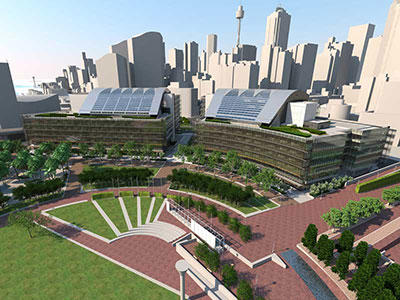The Client
Lend Lease
Lend Lease is one of the world’s leading fully integrated property solutions providers. Founded in Sydney in 1958, Lend Lease primarily operates in Australia, Asia, the UK, Europe, the Middle East and the US, and has built up a long and successful track record in these countries.
Lend Lease’s global project management and construction business, Bovis Lend Lease, is one of the world’s leading construction companies, operating in more than 30 countries worldwide and employing over 7,500 people. Bovis Lend Lease works with clients to create high quality, sustainable property assets.
The Client’s Needs
The Darling Quarter development is a $500 million low rise commercial office and leisure space constructed in Sydney’s Darling Harbour. The project represented a major investment and contribution to the local economy with 7,000 people employed during the three-year construction phase.
The project was awarded a 6-Star Green Star Office Design rating by the Green Building Council of Australia.
The development delivers significant sustainability initiatives, including potable water reduction of 90% through rainwater harvesting and onsite wastewater recycling.
Veolia's Solution
Veolia Water Technologies was awarded a contract by Bovis Lend Lease for the design, build and operation of a recycled water plant as part of the Darling Quarter development.
Veolia Water Technologies was awarded a WICA (Water Industry Competition Act) License for this project in July 2010.
The recycled water plant combines innovative technologies:
- Moving Bed Biofilm Reactor (MBBR™)
- Neosep® Membrane Bioreactor
- Multipure Plus Reverse Osmosis unit
The process treats 245 kilolitres a day of sewage through sewer mining to produce 166 kilolitres a day (60ML/year) of high quality recycled water for reuse for toilet flushing, irrigation and cooling tower make-up water.
The MBBR™ and Neosep® MBR technologies are ideal for sewage water treatment to withstand variations in the load and can provide high removal of bacteria, viruses and suspended solids. Reverse osmosis removes salts from the feed water.
The recycled water plant was designed to fit within the site’s spatial constraints.



